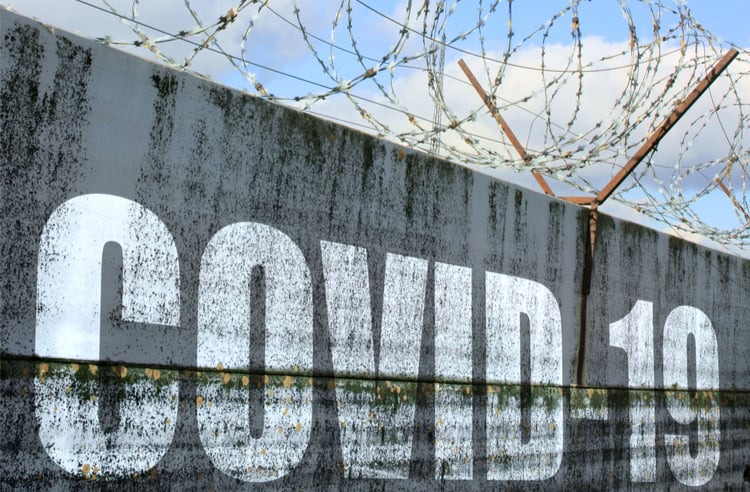There will be blood: COVID-19, coup d'etat and capital punishment

Image from Shutterstock.com.
As America is left reeling from the violent insurrection at the U.S. Capitol, the infamous last days of Donald J. Trump’s presidency will be remembered for lawlessness, incitement and a bloody coup attempt by a right-wing mob.

Photo of Liane Jackson by Callie Lipkin/ABA Journal.
As Congress attempts a second impeachment and invocation of the 25th Amendment, still burning in the background is a pandemic raging out of control, with nearly 400,000 deaths from COVID-19 and a flailing vaccination rollout that has been overshadowed by Trump’s election obsession. Between coronavirus casualties, families separated at the border, civil unrest, police brutality and a macabre execution spree, the U.S. arguably has become less that ‘shining city on a hill’ and more like a house of horrors.
In too many cases over the last four years, collateral damage has been deemed acceptable in the service of expediency and political gain. Political ideology has grown dangerously aligned with totalitarian regimes where the rule of law is not just an afterthought, it’s an oxymoron. Guilt or innocence have been less important than a message of tough intolerance—except for those allied with Trump, who are given a pass (e.g., the Capitol insurrection and the 2017 Charlottesville white supremacy rally).
Even as the country mourns the most recent desecration of democracy, bloodshed continues unabated: Tomorrow the administration is pressing forward with the Jan. 12 lethal injection of Lisa Montgomery, the only woman on federal death row and the first to be executed in nearly 70 years.
Eye for an eye
A tough “law and order” approach to justice has been the hallmark of this administration, often with alacrity and vengeance prioritized over constitutional rights. President Trump has encouraged a more aggressive police force, unleashed law enforcement on peaceful civilian protesters, incited and praised violent white supremacists, denigrated science, and this year instigated the bloodiest sweep of death row in more than a century.
But Trump’s revival of the federal death penalty after decades of dormancy isn’t just about criminal justice; it’s a reflection of his administration’s Old Testament throughline that has infected every aspect of his national response.
While nearly every nation in Europe and Latin America has abandoned capital punishment, and with public support in the U.S. at an all-time low, the Trump administration nonetheless reinstated federal executions for the first time in 17 years, and wasted no time playing catch up.
In 2020, the Federal Bureau of Prisons executed 10 inmates in six months, more than all the states combined. The pandemic has imperiled those working to implement the executions, has compromised defense teams’ ability to effectively represent their clients, and even prevented witnesses’ presence at executions. Nonetheless the DOJ has pressed forward with its draconian agenda, planning executions within days of President-elect Joe Biden’s inauguration.
As could be expected, carrying out executions during a pandemic has created a reckless domino effect, adding strain to a system already ill-equipped to deal with disease. “The government’s rush to kill has caused senseless risk for incarcerated people, prison staff, and everyone who lives in Terre Haute, Indiana,” the ACLU wrote in an analysis of data from the Bureau of Prisons showing federal executions likely caused a COVID-19 spike.
In November, ABA President Patricia Lee Refo wrote President Trump, urging him to offer reprieves: “At a time of national crisis such as this, the public interest is not served by rushing forward with executions at the expense of due process, fundamental fairness, and individual health and safety.”
By any means necessary
But it’s all in pursuit of a barbaric sense of “justice” that disregards human rights and public sentiment. To expedite the killings, Attorney General William Barr bypassed laws regarding the acquisition of lethal injection drugs and fast-tracked a rule to expand execution methods to include death by firing squad and electrocution.
Montgomery is mentally ill, takes antipsychotic medications and her competency to be executed has been regularly monitored. A federal court granted a temporary stay in her case in November after both of her attorneys became ill with COVID-19 and were unable to file a clemency petition on her behalf, but her execution has been reinstated.
In addition, Cory Johnson, who attorneys have argued is intellectually disabled, is set for lethal injection Jan. 14, and Dustin John Higgs is scheduled to be put to death on Jan. 15. Both Johnson and Higgs have tested positive for COVID-19, and their attorneys are petitioning for stays of execution.
The likelihood any death row inmate would get a pardon from Trump is laughable low—so far clemency from the president has been largely reserved for war criminals, corrupt political allies and friends. It’s also unlikely the conservative-leaning U.S. Supreme Court would grant any last-minute reprieve, as the justices have been busy rejecting habeas petitions and reversing stays of execution.
While Catholic justices Brett M. Kavanaugh, John G. Roberts Jr., Clarence Thomas, Amy Coney Barrett and Samuel A. Alito Jr. have mostly co-signed Trump’s death penalty agenda, this fall the Roman Catholic Church unequivocally stated that executions are universally unacceptable and that it would work toward abolition, a position President-elect Biden, a practicing Catholic, supports.
Pope Francis has declared opposition to capital punishment based not just on mercy, but in opposition to the idea of revenge and “viewing punishment in a vindictive and even cruel way.”
State executions and new death sentences imposed are at their lowest levels in decades, continuing a sharp decline that began in 1999. But Trump has made no secret of his philosophy, telling Larry King in 1989: “Maybe hate is what we need if we’re gonna get something done,” a statement he made pushing for executions in the notorious “Central Park Five” case, where five Black and Latino teens were wrongfully convicted of murdering a jogger.
“They should be forced to suffer and, when they kill, they should be executed for their crimes. They must serve as examples for their crimes,” Trump wrote in the $85,000 full-page ads he took out in four New York papers after the teens were arrested.



